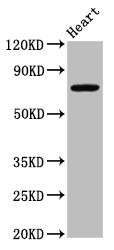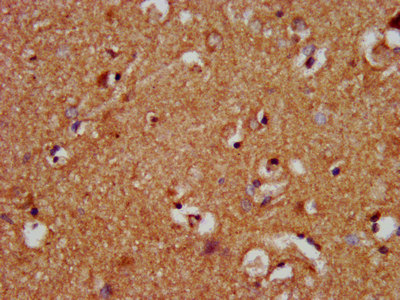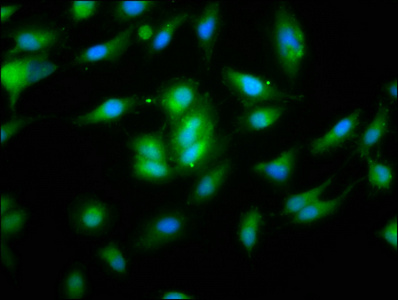NLRP10
NLRP10,即含NLR家族pyrin结构域10,别名NOD8、PAN5、PYNOD、NALP10、CLR11.1。NLRP10作为信号诱导的多蛋白复合体(炎症小体)的一部分,激活促炎半胱天冬酶caspase-1和caspase-5,同时NLRP10也被认为是炎症和细胞凋亡的多功能负调节因子。NLRP10在先天免疫系统中发挥调节作用,参与对其他生物体的防御响应、基于免疫球蛋白超家族结构域的免疫受体的体细胞重组的适应性免疫应答的正调控,以及细胞因子生产的正调控。NLRP10与多种疾病相关,包括Petrositis和神经发育障碍伴不自主运动。
热销产品
NLRP10 Antibody (CSB-PA773044LA01HU)
验证数据

Western Blot
Positive WB detected in: Rat heart tissue
All lanes: NLRP10 antibody at 4.9μg/ml
Secondary
Goat polyclonal to rabbit IgG at 1/50000 dilution
Predicted band size: 76 kDa
Observed band size: 76 kDa

IHC image of CSB-PA773044LA01HU diluted at 1:400 and staining in paraffin-embedded human brain tissue performed on a Leica BondTM system. After dewaxing and hydration, antigen retrieval was mediated by high pressure in a citrate buffer (pH 6.0). Section was blocked with 10% normal goat serum 30min at RT. Then primary antibody (1% BSA) was incubated at 4°C overnight. The primary is detected by a biotinylated secondary antibody and visualized using an HRP conjugated SP system.

Immunofluorescence staining of Hela cells with CSB-PA773044LA01HU at 1:133, counter-stained with DAPI. The cells were fixed in 4% formaldehyde, permeabilized using 0.2% Triton X-100 and blocked in 10% normal Goat Serum. The cells were then incubated with the antibody overnight at 4°C. The secondary antibody was Alexa Fluor 488-congugated AffiniPure Goat Anti-Rabbit IgG(H+L).
NLRP10 Antibodies
NLRP10 for Homo sapiens (Human)
| 产品货号 | 产品名称 | 种属反应性 | 应用类型 |
|---|---|---|---|
| CSB-PA197311 | NLRP10 Antibody | Human,Mouse | ELISA,WB |
| CSB-PA207849 | NLRP10 Antibody | Human | ELISA,IHC |
| CSB-PA773044LA01HU | NLRP10 Antibody | Human, Rat | ELISA, WB, IHC, IF |
| CSB-PA773044LB01HU | NLRP10 Antibody, HRP conjugated | Human | ELISA |
NLRP10 Proteins
NLRP10 Proteins for Homo sapiens (Human)
| 产品货号 | 产品名称 | 来源 |
|---|---|---|
| CSB-YP773044HU CSB-EP773044HU CSB-BP773044HU CSB-MP773044HU CSB-EP773044HU-B |
Recombinant Human NACHT, LRR and PYD domains-containing protein 10 (NLRP10) | Yeast E.coli Baculovirus Mammalian cell In Vivo Biotinylation in E.coli |










